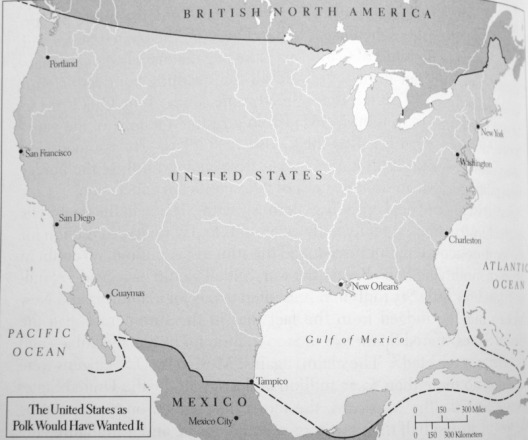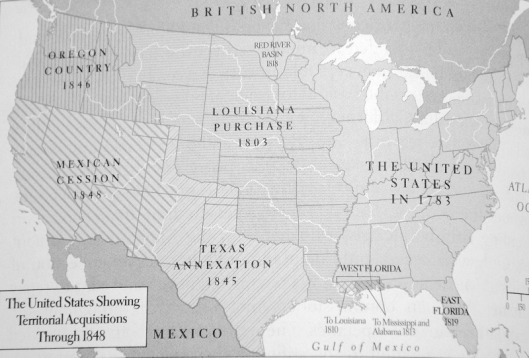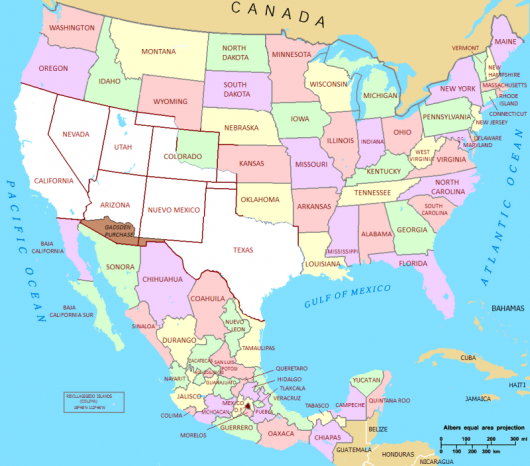TRIST AND POLK FIGHT OVER BEST COURSE OF ACTION
Polk wanted the cession of almost all of Mexico; Trist, the negotiator of the Treaty, defied the President to insure a peace between Mexico and the US and ample land in the Mexican Cession.
"For though it would not have done for me to say so there, that was a thing for every right-minded American to be ashamed of."
--Nicholas Trist, on the Mexican War (Howe 805).
Nicholas Trist, United States diplomat at the Cuban consulate:
-dispatched to General Winfield Scott’s headquarters in Mexico City to negotiate terms of peace and land cession with Mexican temporary government and General Santa Anna
Polk: imperialist and wanted Mexican land. However:
“Faced with the implacable hostility of the Mexican people to surrendering any part of their country to the United States, how could he obtain a treaty of cession?” (Howe 800).
-"The Spanish blood will not mix well with the Yankee" (Prescott quoted in Herring 204).
-April 1847: Polk instructed for the Rio Grande border a little piece of land beyond
-As negotiations continued: Polk wanted Baja California and Northern Mexico with more ambition after reviewing American military achievements
-Trist believed that "Santa Anna wished to make peace but not upon the terms which the American administration desired" (Bauer 381).
-dispatched to General Winfield Scott’s headquarters in Mexico City to negotiate terms of peace and land cession with Mexican temporary government and General Santa Anna
Polk: imperialist and wanted Mexican land. However:
“Faced with the implacable hostility of the Mexican people to surrendering any part of their country to the United States, how could he obtain a treaty of cession?” (Howe 800).
-"The Spanish blood will not mix well with the Yankee" (Prescott quoted in Herring 204).
-April 1847: Polk instructed for the Rio Grande border a little piece of land beyond
-As negotiations continued: Polk wanted Baja California and Northern Mexico with more ambition after reviewing American military achievements
-Trist believed that "Santa Anna wished to make peace but not upon the terms which the American administration desired" (Bauer 381).
-Polk recalled Trist to be replaced by a more ambitious negotiator
-Trist felt compelled to continue the established negotiations of peace with the Mexicans.
“Trist perceived that Mexican political realities dictated reaching an accord with the liberal moderados who had succeeded Santa Anna; if this were not achieved soon, power would pass to intransigents [people who sought no compromise]” (Howe 802).
-Trist convinced the Mexicans to take relatively generous offer, before General Butler (replacement of Trist's aid Gen. Scott) could apprehend him
-Trist felt compelled to continue the established negotiations of peace with the Mexicans.
“Trist perceived that Mexican political realities dictated reaching an accord with the liberal moderados who had succeeded Santa Anna; if this were not achieved soon, power would pass to intransigents [people who sought no compromise]” (Howe 802).
-Trist convinced the Mexicans to take relatively generous offer, before General Butler (replacement of Trist's aid Gen. Scott) could apprehend him
“Knowing it to be the very last chance, and impressed with the dreadful consequences to our country which cannot fail to attend the loss of that chance I will make a treaty, if it can be done, on the basis of the Bravo, and across by the 32º; giving 15 millions besides the 3 millions cash"
--Trist (Bauer
--Trist (Bauer
-Treaty, signed at Guadalupe Hidalgo, sacred site, in the Mexican public (2/2/48) to justify its validity from a democratic standpoint.
-Trist saw peace more important than Polk's All-Mexico conquest ambition.
-wanted a treaty, acceptable to be ratified in the Mexican Congress and in the United States:
-Trist saw peace more important than Polk's All-Mexico conquest ambition.
-wanted a treaty, acceptable to be ratified in the Mexican Congress and in the United States:
“In this I was governed by two considerations: one was the iniquity of the war, as an abuse of power on our part; the other was the more disadvantageous the treaty was made to Mexico, the stronger would be the ground of opposition to it in the Mexican Congress.”
--Trist (Howe 805)
--Trist (Howe 805)
-Despite opponents of Trist’s unjustified usurpation of power: renegotiation nearly impossible:
The Mexicans were already devastated with the chaos; ceding more land would provoke more war.
-Contemporary historians: Trist’s actions to defy Polk were “a truly noble act” to insure peace.
The Mexicans were already devastated with the chaos; ceding more land would provoke more war.
-Contemporary historians: Trist’s actions to defy Polk were “a truly noble act” to insure peace.
“His recognition of a moral standard higher than the unbridled pursuit of national interest was no doubt unusual in the history of diplomacy” (Howe 805).



